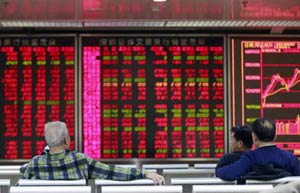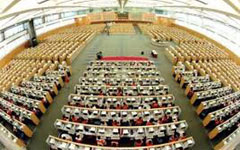China underlines integrity in capital market
Updated: 2014-08-05 09:00
(Xinhua)
|
|||||||||||
BEIJING - China is planning a system to monitor and record whether players within its capital market act with integrity.
Ensuring moral conduct is essential to ensure the healthy growth of the market, according to Zhuang Xinyi, vice-chairman of the China Securities Regulatory Commission (CSRC).
Zhuang's remarks in Monday's Shanghai Securities News came after a guideline unveiled in June on building a "social credit system" to assess the behavior of citizens as well as companies and organizations in China.
The guideline specified that the capital market should impose harsher punishments for insider trading and releasing fake information, and more closely supervise securities and futures practitioners and managers of listed companies.

|
 |
The CSRC will also toughen punishments for violations involving breaches of faith, especially through fraud during initial public offerings, release of fake information, insider trading, market manipulation and serious dereliction of duty by brokerage firms.
Wang Lianzhou, economist and honorary chairman of the International Investment and Management Association under Peking University, said recent stock market violations such as insider trading and fake accounting have hurt Chinese investors' confidence.
Many investors have became reluctant to participate in the substandard market, and the stock market has thus lost part of its function of providing finance for companies, according to Wang.
Fraud in listed companies's financial reports is not uncommon, partly due to insufficient supervision and punishment.
In May, Nanjing Textiles Import and Export Corp. admitted that it artificially raised its profits between 2006 and 2010 by 344 million yuan ($55.8 million), but was penalized by the regulator for only 500,000 yuan.
"Severe punishments must be imposed no matter who violates the regulations. Only by raising the cost of violations and giving full play to the power of laws and supervision can the market grow in a healthy way," Wang said.
But Zhuang said that the fundamental goal is to reach a stage where market participants can be relied upon to voluntarily obey laws and act with integrity.
He added that China should step up construction of a system logging the morality of market players' conduct as well as one for punishments and rewards for bad and good conduct.
Related Stories
Capital market reform catalyst for China's restructuring 2014-07-03 10:52
Forecasts: IPOs won't have major sway on market 2014-07-01 07:38
China to fuel capital market's sound expansion 2014-05-20 10:47
Securities firms can tap private capital market 2014-05-19 09:47
Reforming the capital market 2014-05-14 07:22
Chinese shares up on capital market guidelines 2014-05-12 17:32
Today's Top News
Premier Li sets out for Yunnan quake zone
Suicide among elderly increases
China's Fosun agrees $441m takeover of Roc Oil
China offers $1.5m aid to Gaza
Fleeting Clouds goes global at Edinburgh Festival
Local heroes to be rewarded
Shanghai: 'Zero tolerance' for food violations
'Air corridors' to reduce pollution
Hot Topics
Lunar probe , China growth forecasts, Emission rules get tougher, China seen through 'colored lens', International board,
Editor's Picks

|

|

|

|

|

|





